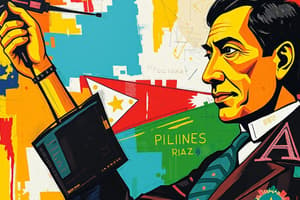Podcast
Questions and Answers
What literary work is considered a masterpiece of Philippine literature that opposes Spanish colonialism?
What literary work is considered a masterpiece of Philippine literature that opposes Spanish colonialism?
- Malaya Irredenta
- Noli Me Tangere (correct)
- Bernardo Carpio
- Doctrina Christiana
The Doctrina Christiana was published in 1591 and was significant as the first book in the Philippines.
The Doctrina Christiana was published in 1591 and was significant as the first book in the Philippines.
True (A)
Who is associated with the quote, 'the pen was indeed mightier than the sword'?
Who is associated with the quote, 'the pen was indeed mightier than the sword'?
Jose Rizal
The book ________ was pivotal in expressing the desire to reconcile the Malay people during colonial times.
The book ________ was pivotal in expressing the desire to reconcile the Malay people during colonial times.
Match each literary work with its significance:
Match each literary work with its significance:
What concept does the character Bernardo Carpio represent in Philippine literature?
What concept does the character Bernardo Carpio represent in Philippine literature?
Jose Rizal's writings inspired several leaders during the 20th century.
Jose Rizal's writings inspired several leaders during the 20th century.
What was the primary language used in the catechisms of the Doctrina Christiana?
What was the primary language used in the catechisms of the Doctrina Christiana?
What is one of the main purposes of the Rizal Law?
What is one of the main purposes of the Rizal Law?
Claro M. Recto, Jr. proclaimed that there is an official law naming a national hero.
Claro M. Recto, Jr. proclaimed that there is an official law naming a national hero.
What date is commemorated as a day of mourning for Dr. Jose Rizal?
What date is commemorated as a day of mourning for Dr. Jose Rizal?
The Philippines gained its independence from the United States on __________.
The Philippines gained its independence from the United States on __________.
Match the following events with their outcomes:
Match the following events with their outcomes:
Which of the following best describes Rizal's impact according to the Rizal Law?
Which of the following best describes Rizal's impact according to the Rizal Law?
The country was highly independent in social aspects immediately following World War II.
The country was highly independent in social aspects immediately following World War II.
What is stated as necessary for nurturing nationalism?
What is stated as necessary for nurturing nationalism?
What was Rizal's first sorrow?
What was Rizal's first sorrow?
Rizal's family was affluent and had no financial struggles.
Rizal's family was affluent and had no financial struggles.
In what year did Rizal and his father leave for a pilgrimage to Antipolo?
In what year did Rizal and his father leave for a pilgrimage to Antipolo?
Rizal had his early education in __________ and Binan.
Rizal had his early education in __________ and Binan.
Which college did Rizal enroll in after leaving for Manila?
Which college did Rizal enroll in after leaving for Manila?
Match Rizal's activities with the respective details:
Match Rizal's activities with the respective details:
Rizal's mother significantly influenced his early education and spirituality.
Rizal's mother significantly influenced his early education and spirituality.
What poem did Rizal write about his childhood impressions?
What poem did Rizal write about his childhood impressions?
Flashcards are hidden until you start studying
Study Notes
Rizal Law
- Enacted to recognize the relevance of Rizal's ideals, thoughts, teachings, and values to present conditions
- Aims to develop an understanding and appreciation of Jose Rizal's qualities, behavior, and character
- Designed to foster nationalism among Filipino youth
- Emphasized that knowing history is crucial for understanding the present and developing a connection with the past figures
Historical Context
- The Philippines gained independence from the United States on July 4, 1946
- The country was heavily dependent on the US economically, socially, and politically
- The Bell Trade Act granted free trade between the Philippines and the US
- The Philippines faced rampant crime, opportunism, and corruption following World War II
- The Communist rebellion posed a significant threat to the country
Rizal As A Hero
- The Decree of December 20, 1898, declared December 30 a national day of mourning in honor of Dr. Jose Rizal and other victims of the Philippine Revolution
- Rizal's writings demonstrated the power of the pen over the sword, challenging corruption and injustices perpetrated by Spanish officials and friars
- His work was considered subversive against Spanish colonialism
Rizal and Nationalism
- Nationalism is nurtured by a sense of history, encompassing the past, the individuals who shaped it, and their thoughts and deeds, as described by Claro M. Recto, Jr.
- Rizal's writings, such as "The Philippines: A Century Hence," inspired individuals like Wenceslao Vinzons to contribute to the struggle for freedom and national identity
- The concept of "Maphilindo" reflects a desire to unite the Malay people, who were perceived as divided by artificial colonial borders
- Rizal's works were seen as a catalyst for igniting Filipino nationalism and inspiring the desire for independence
Economic Aspects of Rizal's Time
- The Philippine government struggled with limited resources, while the church amassed wealth
- Economic disparity existed between the impoverished government and the wealthy friars
- Rizal's writings provided insights into the economic injustices prevalent during Spanish colonialism
Rizal's Childhood and Early Education
- Born into a devout Catholic family, Rizal's religious upbringing had significant influence
- His mother, Teodora Alonzo, played a crucial role in his early education, teaching him basic literacy and values
- He initially received education in Calamba and Binan, demonstrating his family's dedication to his development
Rizal's Early Influences and Writing
- His early exposure to Catholicism shaped his religious perspectives
- Fr. Leoncio Lopez, his tutor, further fostered his spiritual education
- Rizal's writing reflects his early experiences and influences, including his family, education, and faith
- His works explored social issues, challenging the injustices and corruption prevalent in colonial society
Rizal's Early Education in Manila
- Rizal’s mother’s imprisonment and the martyrdom of Gom-Bur-Za influenced his move to Manila
- He enrolled at the Ateneo Municipal, managed by Spanish Jesuits, showcasing his intellectual curiosity and dedication
- He excelled in his studies and enjoyed the guidance of Jesuit educators, demonstrating his academic potential
- His early education in Manila solidified his intellectual abilities and fueled his desire for knowledge, preparing him for bigger challenges later in life
Rizal's Early Faith
- Rizal's strong faith and dedication to Catholicism played a significant role in his life
- His devout family instilled in him the value of religion, influencing his moral compass and development
- He displayed deep devotion and adherence to his beliefs, finding solace and guidance through faith
Rizal's Education in Ateneo
- He impressed his professors with his sharp intellect and commitment to learning
- The Ateneo provided him with a structured and rigorous education, fostering his analytical skills and intellectual growth
- His time at the Ateneo was crucial in laying the foundation for his future academic achievements and influential career
Doctrina Christiana
- The first book published by Dominicans in 1591, signifying the early spread of Catholic teachings
- The catechisms were presented in Tagalog, Spanish, and Chinese, demonstrating the efforts to bridge cultural and linguistic differences
Secular Literature
- Secular literature, introduced by the Spaniards, appealed to the Filipino natives
- The story of Bernardo Carpio, popular among locals, showcases adaptation of Spanish narratives to Filipino contexts
- Rizal, in his writings, acknowledged and incorporated elements of Filipino literature, showcasing a blend of cultural influences
Studying That Suits You
Use AI to generate personalized quizzes and flashcards to suit your learning preferences.




